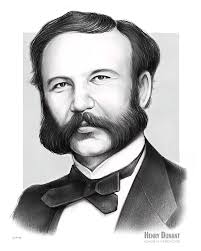
Henry
Henry Dunant, also known as the father of the Red Cross Society, was a Swiss humanitarian, businessman, and social activist. He was born on May 8, 1828, in Geneva Switzerland and died on October 30, 1910. His father was a businessman, and her mother was a gentle and pious woman. He co-founded the Red Cross and served as its creator, advocate, and visionary. Together with Frédéric Passy, he was awarded the inaugural Nobel Peace Prize in 1901.
First Swiss recipient of the Nobel Prize was Dunant. Dunant saw the aftermath of the Battle of Solferino in Italy in 1859. The International Committee of the Red Cross (ICRC) was founded in 1863 as a result of the memories and experiences he chronicled in the book A Memory of Solferino. Dunant’s suggestion for a separate institution to care for injured troops served as the foundation for the Geneva Convention of 1864.The Swiss branch of YMCA was established by Dunant.
Book Review
When society is governed by law it is called an organized society, where everyone lives peacefully. But the problem arises when we see the cases of armed conflict and natural disasters. In both the cases society is no longer able to be fully governed by law: our simple organized society has turned into a chaotic society. Safety, security and even survival of everyone are threatened. “Suffering is universal”. We can understand this sentence with two examples.
The first one is a historical event and the second one is a psychological event. Example of historical event, In the year 1951 a refugee convention was signed among European nations and some countries in which it was assumed that refugees are found only in European continent. After 15 years in 1966 by amendment in 1951 convention on refugees it was added that refugees can be found in any part of world. Example of psychological event, when we were child, we felt only our own pain/suffering but as we grew up, we started feeling other’s pain and suffering.
From both of these events what I want to convey is that, first we think of ourselves, then for our family, then for our society, then for our country and then for the whole world. Similarly, Europeans also first thought about themself and assumed that refugees are found in Europe only but later they realized that refugees can be found in any part of world and make the necessary amendments. Everyone is suffering from one or another thing. It could be mentally, physically, socially, economically or anything. When we are able to feel the suffering of others then we realize that “suffering is universal”.
When Henry Dunant watched the miseries and sufferings which were the result of wars and disasters. He started a movement called RED CROSS MOVEMENT which was not confined to a particular time, race, religion or culture. At the same time, he also realized that even the war(“violence”) has destroyed everything (“whole world”); but the feeling of brotherhood, harmony and unity was not destroyed by war, yes it (brotherhood, harmony and unity) got a little damaged (that’s why we saw that the crimes rate was generally increased after a war or disaster), but this damage can be repaired by love, sympathy, care, affection and help.
He also mentioned that each member of society participates in the voluntary work according to their capacities and capabilities, in his words “Every house had become an infirmary and each household had plenty to do in taking care of the wounded officers within its doors”. He described the importance of human resource, in his words “There was water and food, but even so, men died of hunger and thirst; there was plenty of lint, but there were not enough hands to dress wounds”. In this book two pictures of human behavior can be seen through his writings, in which people don’t believe each other and fought till their last breath, like he wrote “The man reached for a loaded pistol which was beside him, and fired point blank at his rescuer”.
Henry Dunant presents the other side of the coin of the wars through his works and writings. The objectives of Dunant’s proposals were twofold: first, to establish voluntary relief societies for the purpose of providing care for the wounded in times of war in every nation; second, to develop an international principle that would serve as the foundation and support for the relief societies and be sanctioned by a Convention. ‘A Memory of Solferino’ was first published in 1862, this book has since been reprinted.
Henry Dunant’s account of the wars and the subsequent events, as well as his own involvement in them, are not all that can be found in this book. He also makes suggestions and ideas for the future in an effort to stop the suffering that he witnessed at Solferino. Dunant’s book became more than just another chronicle of battle thanks to these bold yet modest ideas and the speed with which they were implemented. A thorough grasp of the Red Cross, a global humanitarian organization, requires reading this book, which is still well worth doing.
By: Satyam Mangal
Write and Win: Participate in Creative writing Contest & International Essay Contest and win fabulous prizes.


